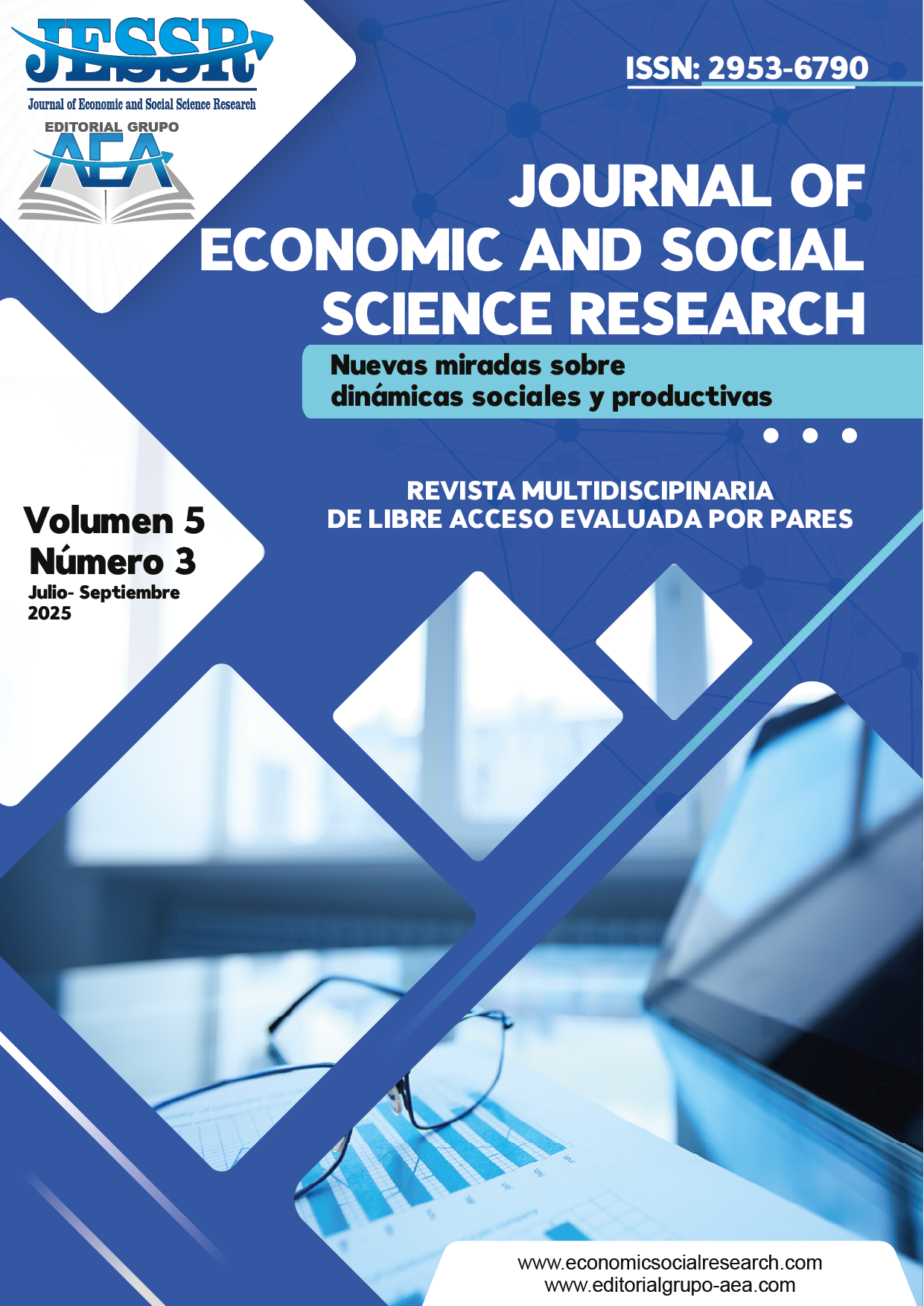Key factors for promoting collaboration in innovation activities in SMEs
Main Article Content
Abstract
Collaborative innovation has emerged as a strategic pillar for strengthening the competitiveness of small and medium-sized enterprises (SMEs) in rapidly changing and highly competitive environments. This study aims to identify and analyze the internal organizational factors that promote effective collaboration in innovation activities within SMEs located in the Metropolitan District of Quito. A sequential explanatory mixed-methods design was employed, combining structured surveys administered to 75 SMEs from the construction, advanced statistical analysis (linear regression, logistic regression, ANOVA, and Spearman correlation), and qualitative triangulation. The findings reveal that the effectiveness of innovation collaboration is not determined by the frequency of external interactions, but rather by the strength of specific internal capacities: a collaborative organizational culture, adaptive capacity, and technological readiness. A logical causal model was constructed to explain how these organizational factors significantly influence innovation outcomes. Notably, technological readiness was found to increase the likelihood of innovation implementation (OR ≈ 6.43). The study concludes that successful innovation collaboration must be understood as a structured, internally-driven process rather than a spontaneous practice. Practical implications include strengthening a culture of collaboration, investing in digital transformation, and fostering structured.
Downloads
Article Details
Section

This work is licensed under a Creative Commons Attribution-NonCommercial 4.0 International License.
How to Cite
References
Antolín-López, R., Céspedes-Lorente, J., García-de-Frutos, N., Martínez-del-Río, J., & Pérez-Valls, M. (2015). Fostering product innovation: Differences between new ventures and established firms. Technovation, 41, 25-37. https://doi.org/10.1016/j.technovation.2015.02.002
Budiarti, I., & Firmansyah, D. (2025). Sustainable SMEs Performance: Knowledge Management, Human Resources Digital Transformation, and Innovation Capabilities – A Practical Approach to Business in the Digital Age. Preprints. https://doi.org/10.20944/preprints202502.1713.v1
Casanova-Villalba, C. I. (2022). Desafíos en el crecimiento empresarial en Santo Domingo: Un análisis de los factores clave en el periodo 2021-2022. Journal of Economic and Social Science Research, 2(3), 1–12. https://doi.org/10.55813/gaea/jessr/v2/n3/53
Chesbrough, H. (2020). To recover faster from Covid-19, open up: Managerial implications from an open innovation perspective. Industrial Marketing Management, 88, 410–413. https://doi.org/10.1016/j.indmarman.2020.04.010
Córdoba-Vega, Juan M, & Naranjo-Valencia, Julia C. (2017). Incidencia de la Inversión en Innovación en las Ventas de Productos Innovadores. Evidencia Empírica en Empresas Manufactureras de Colombia. Información tecnológica, 28(2), 153-166. https://dx.doi.org/10.4067/S0718-07642017000200017
Creswell, J. W., & Plano Clark, V. L. (2018). Designing and conducting mixed methods research (3rd ed.). SAGE Publications. https://doi.org/10.1177/1094428108318066
Durst, S., & Temel, S. (2025). The interplay between open innovation and knowledge management in SMEs. En Open Innovation: Bridging Theory and Practice (pp. 73–91). World Scientific. https://doi.org/10.1142/9789819807994_0005
Flick, U. (2015). El diseño de la investigación cualitativa. Revista Investigación Cualitativa, 1(1), 107–117. https://doi.org/10.23935/2016/01018
Heaton, S., & Min, J. (2025). Open innovation in ecosystems: Exploring how the affiliation of an ecosystem partner impacts the benefits of collaboration in open innovation. Research Policy, 54(2), 105168. https://doi.org/10.1016/j.respol.2024.105168
Hurtado Guevara, R. F., & Pinargote Pinargote, H. M. (2021). Factores limitantes del crecimiento económico en las PYMES de Quinindé. Journal of Economic and Social Science Research, 1(1), 49–60. https://doi.org/10.55813/gaea/jessr/v1/n1/20
Instituto Nacional de Estadística y Censos (INEC). (2023). Encuesta Nacional de Empleo, Desempleo y Subempleo (ENEMDU) - Boletín técnico anual enero-diciembre 2023. Quito, Ecuador: INEC. Recuperado de https://www.ecuadorencifras.gob.ec/documentos/web-inec/EMPLEO/2023/anual/Boletin_tecnico_anual_enero-diciembre_2023.pdfPrimicias+3
Kodama, M. (2018). Developing strategic communities for innovation: The case of open innovation. En A. Inoue (Ed.), Researching Open Innovation in SMEs (pp. 151–178). World Scientific. https://doi.org/10.1142/9789813230972_0006
Madrid-Guijarro, A., & Garcés-Torres, A. (2023). Open innovation in Ecuadorian SMEs: The importance of strategy and the moderating effect of control. Management and Organization Review, 19(3), 533–566. https://doi.org/10.1017/mor.2022.28
Morales Pulido, M. I. (2025). Innovación desde la transformación digital en las PYMEs. European Public & Social Innovation Review, 10, 1–15. https://doi.org/10.31637/epsir-2025-1138
OECD. (2021). SME and Entrepreneurship Outlook 2021. OECD Publishing. https://doi.org/10.1787/97a5bbfe-en
OECD. (2022). Financing SMEs and Entrepreneurs 2022: An OECD Scoreboard. OECD Publishing. https://doi.org/10.1787/e9073a0f-en
OECD. (2023). OECD Science, Technology and Innovation Outlook 2023: Enabling Transitions in Times of Disruption. OECD Publishing. https://doi.org/10.1787/0b55736e-en
Powell, W. W., Koput, K. W., & Smith-Doerr, L. (1996). Interorganizational collaboration and the locus of innovation: Networks of learning in biotechnology. Administrative Science Quarterly, 41(1), 116–145. https://doi.org/10.2307/2393988
Ritala, P., Agouridas, V., Assimakopoulos, D., & Gies, O. (2013). Value creation and capture mechanisms in innovation ecosystems: A comparative case study. International Journal of Technology Management, 63(3/4), 244–267. https://doi.org/10.1504/ijtm.2013.056900
Seawright, J. (2016). Case selection in small-N research. In Oxford Research Encyclopedia of Politics. Oxford University Press. https://doi.org/10.1093/acrefore/9780190228637.013.169
Teece, D. J. (2018). Business models and dynamic capabilities. Long Range Planning, 51(1), 40–49. https://doi.org/10.1016/j.lrp.2017.06.007
Zhang, W., Malik, K., & Gagliardi, D. (2024, agosto). Digital transformation of SMEs: A dynamic capabilities perspective. Academy of Management Proceedings, 2024(1). https://doi.org/10.5465/amproc.2024.17504abstract





